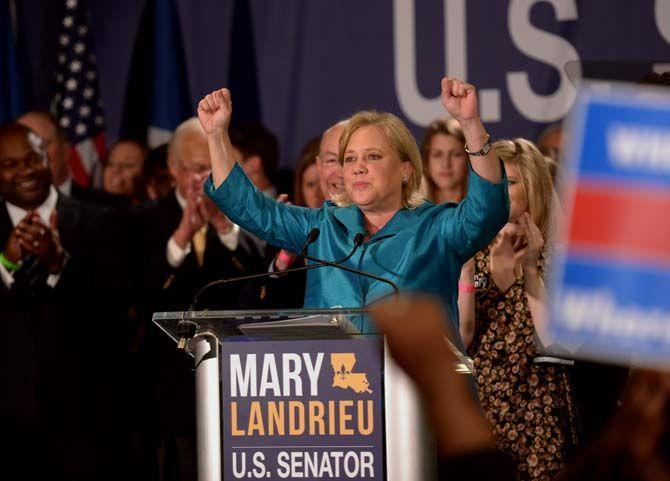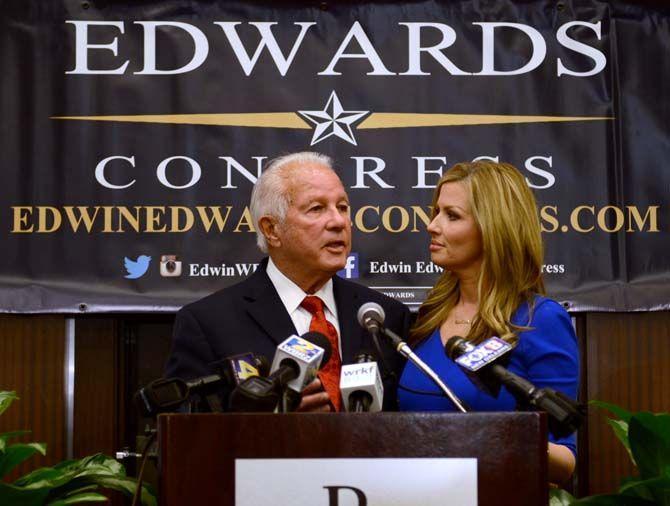Mary Landrieu and Edwin Edwards must be catching their breath.
After the results of last night’s election, the two Democratic candidates find themselves in an uphill battle to win December’s runoff votes, in which Landrieu will face Republican Bill Cassidy for one of Louisiana’s U.S. Senate seats and Edwards will square off against Republican Garret Graves for the 6th District’s seat in the U.S. House of Representatives.
Landrieu finished with 42 percent of the vote to Cassidy’s 41 percent, while Edwards edged past Graves, 30 percent to 27 percent.
While the results seem like they’d lend themselves cautious optimism for the Democrats in two close battles for the of the seats, the Democratic candidates are at a serious disadvantage here.
Both Landrieu and Edwards benefitted greatly from a lack of any viable Democratic contender in their races, while Cassidy and Graves each fought a number of other conservatives making strong bids.
In their victory (or “this-race-starts-now”) speeches last night, Landrieu and Cassidy both paid their somewhat patronizing respects to Col. Rob Maness, the Tea Party Republican who missed out on the state party’s endorsement but snagged former Alaska Gov. Sarah Palin’s.
Despite his disadvantages, Maness carried 14 percent of the vote, making him the greatest challenger to the two establishment candidates. And while Landrieu was quoting how many miles Maness drove himself around the state in an “aw, isn’t he cute,” kind of way, Cassidy was making the case for Maness’ supporters to flock to his side in December.
Votes against Landrieu are votes for change, Cassidy argued, and come December, he will be the agent of change Maness supporters are looking for.
He probably didn’t need to say anything at all.
Maness’ support was largely built of hardline conservatives and libertarians attracted to his stances on defense, gun rights and immigration — the last people in the world anyone would expect to vote for Mary Landrieu. This is exactly the audience to whom “voted with President Obama 97 percent of the time” is audio poison.
And there shouldn’t be any worry that Cassidy isn’t conservative enough for those voters — his “A” grade from the NRA and calls to secure the border should tie them up easily for him.
This leaves one difficult question: where will Landrieu pick up extra voters?
She can at least take some joy in commiseration with Edwin Edwards, who’ll look at a field previously packed with candidates, now full of conservative voters looking for someone to back.
Edwards’ 6th Congressional District race is about as textbook of a case of vote-splitting as can be found, and he should be thanking whatever voodoo spirits keep him upright that there were so many Republican candidates to keep him from getting embarrassed.
The top three candidates in the race after Graves and Edwards were Paul Dietzel, Dan Claitor and Lenar Whitney, three Republicans who together captured 32 percent of the vote. Had all Republican votes gone to Graves, we wouldn’t be talking about a runoff at all.
Of course, Dietzel’s, Claitor’s and Whitney’s voters won’t all go to support Graves in December, but if his campaign is even remotely competently run, he should clean up. Conventional wisdom would say that Edwards has a decent shot of pulling the moderate vote, given his obvious charm will now be more clearly framed against Graves’ toupeed-sack-of-potatoes charisma, but voters this cycle seem less willing to forgive his being convicted of racketeering and the fact he’ll be 93 years old by the time he leaves office.
With both Landrieu and Edwards having to face just one serious opponent for the first time in this race, it’s not looking good for the Louisiana Democratic Party in December’s runoff.
Gordon Brillon is a 21-year-old mass communication senior from Lincoln, Rhode Island.
Opinion: Landrieu and Edwards face tough December runoffs
November 5, 2014
Sen. Mary Landrieu, D-La., encourages supporters in New Orleans to vote in Dec. 6 runoff elections after the U.S. Senate jungle primaries.
More to Discover












